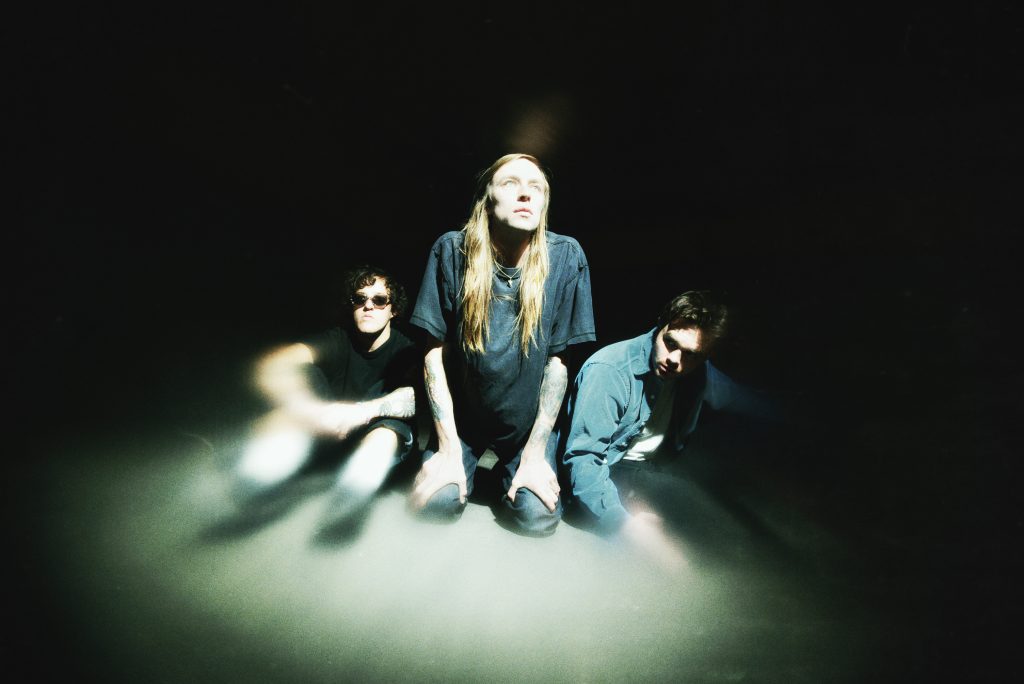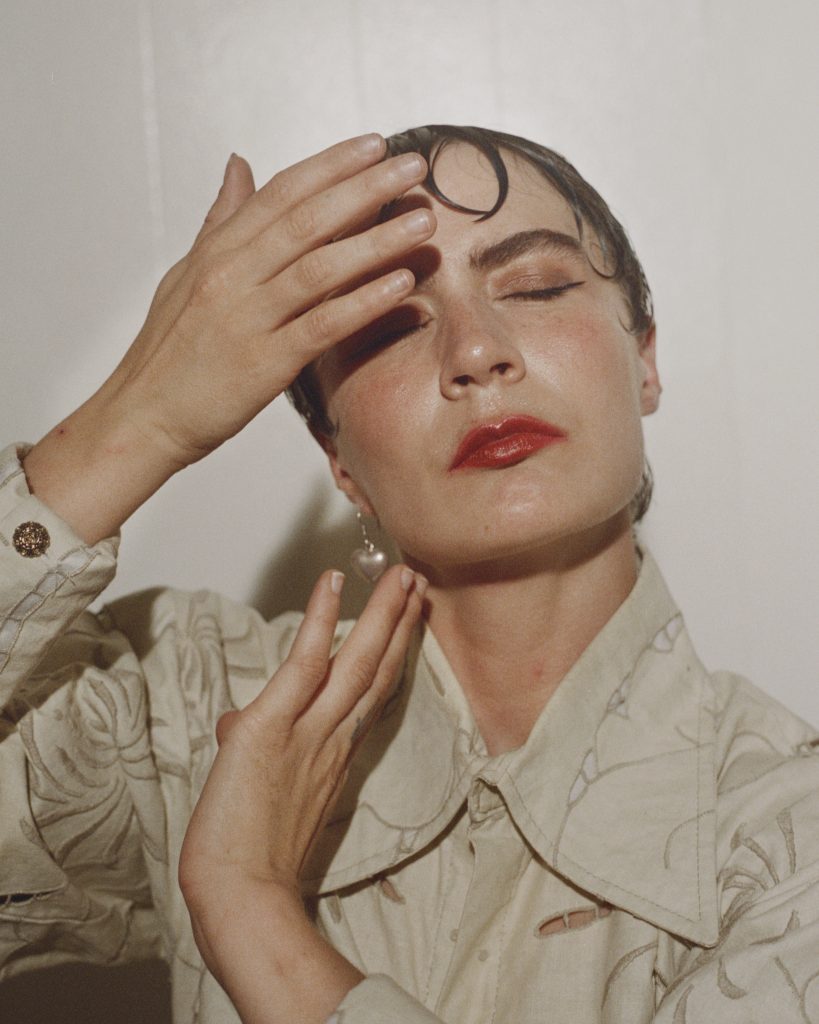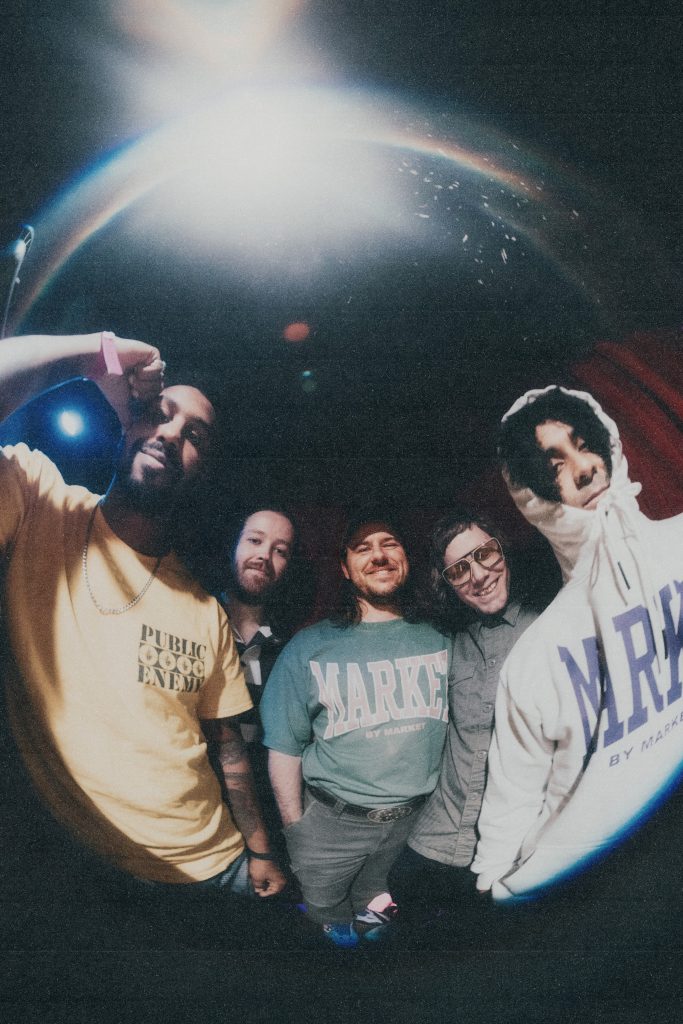
For nearly two decades, Justice Tripp has consistently been ahead of the curve: first with Trapped Under Ice, where he led the way for a new wave of heavy hardcore, and then as the mastermind behind Angel Du$t, where he blazed the trail for the current generation of aggressive musicians to branch out into unabashedly melodic territory. Tripp’s work is marked by an ever-evolving creativity that’s made him highly influential, but which has often put him a number of steps ahead of the very trends that he’s helped to inspire. Now Angel Du$t are back with their new album, Brand New Soul: a fearless and open-hearted tribute to all things rock, offering listeners a chance to be right there with them on the cutting edge. Tripp might forever be keeping an eye on the future, but Angel Du$t’s time is now.
“People can be afraid to grow, afraid to change,” Tripp explains. “But I want to be an artist, I want to change and I want to evolve. I love punk and hardcore, and that’s always going to have a place in my heart, but I want to challenge things.” Enter: Brand New Soul, a record that manages to bridge Angel Du$t’s past, present, and future into a 13 song, 29-minute, one-of-a-kind rock and roll joyride. Recorded by Paul Mercer, mixed by Rob Schnapf and Steve Wright, and produced by Tripp himself, Brand New Soul feels like the most potent encapsulation of Tripp’s vision to date.
The album’s opening title track lays out a collision of punk speed and R&B swagger, all careening into a quasi-breakdown that somehow combines hardcore stomp with a hip-shaking bass line that can’t be ignored. “Brand New Soul” is immediately followed by “Love Slam,” which serves as a pulse-pounding reminder that no matter what sound or style Tripp is playing, hardcore will be part of the DNA. Elsewhere tracks like the furious “Space Jam” or “Sippin Lysol” will inspire those unhinged good times at Angel Du$t shows, and it’s a testament to the success of Tripp’s try-anything approach that those songs flow seamlessly on Brand New Soul alongside songs like the lushly arranged “I’m Not Ready” or the Paul Simon-influenced “Don’t Stop.” Throughout Brand New Soul, Tripp steps out on the line lyrically as well, opening himself up more than ever and imbuing every musical left turn with real pathos.
It’s this combination of heart and inventiveness that makes Brand New Soul such an endearing listen, and the record almost feels like a proof-of-concept for the daring spirit that’s led Tripp his entire life. His story is far from fully written, but ten years into Angel Du$t, it’s finally starting to seem clear that the songwriter’s many creative risks have paid off. The band’s influence is palpable, and Brand New Soul is poised with open arms to bring even more people into the unique world Tripp has created–one where stage dives and sweetness fit perfectly together, and everyone is welcome to get in on the fun. “The music bringing people together is the most important thing,” he says. “I would hope that the biggest impact we’ve had is just encouraging people to express themselves.”

Candy
Candy – The band that holds it all in to best let it all out.
Heaven Is Here is the sort of record that some people may like to describe as groundbreaking or genre bending but this kind of claim comes with a caveat. I’ve got good news for the world: you’re no longer able to redefine hardcore. It was always a figment of someone’s imagination anyway and at this point we’re all trying to guess what it even is, let alone how or why to change it. Breaking ground is no longer about formal innovation but about the desperate and frantic hope that you can make sense of as much information in the world as you possibly can at once. Being human, but pulling the worst of yourself out and putting into your music-making might seem like a reckless way to make a statement but for Candy, it works. Heaven Is Here puts together so many chronologically disparate elements with the confidence and care to graft their relativities together under what basically sounds like extreme duress. Their words and music specifically strive to replicate moments of impact and anxiety, obsessive compulsive thinking, and extreme cynicism so that they might not have to effect how to come down from these types of overwhelming feelings on a day to day basis. Negativity-as-productivity fills the sensational energy that Candy have built into their sound and live shows, and now most specifically their latest LP.
What this record does is help to lengthen the floodplain of what can be considered normal. Heaven Is Here shares so much of what people seek out in fractal, defragmented little blips over a lifetime, and slams them together in some kind of audio ballistics gel of heavy music, electronics, and popular culture. Designing this sort of summary into a piece of work seems simultaneously fearful and egotistical, but is better seen as a reflection of the realistic materials at hand. Speaking directly to their incorporation of electronic elements in Heaven is Here, it’s not so much that Candy insist on progression, but that they will not accept regression. In a day and age in which a primary complaint of alienated, disappointed musicians might be that “you can make music on your phone these days,” Candy in turn feel the same but instead, have rushed to run through what they see as an open door through which to make their music better and more filled with intensified chaos than ever before.
Yet still, they feel there is no line to have stepped across between when they began and where they’ve ended up. Just a fuller realisation of the same intent over the span of multiple recordings and a mass of gigs. There is, however, a line through time for Candy. One which permeates all iterations of “extreme” music – from the most simplistic and un-nuanced, to what we now consider the touchpoints of the cannon.
“I find it funny that we sometimes treat old extreme music like Throbbing Gristle or gabber, or Nitzer Ebb as wildly different than other artists working in similar time-frames, like United Mutation, Crossed Out, or Disclose” says guitarist, Michael Quick, who calmly manages to organise his musical intentions with the experience of having to exist in a long long history of sub-genre habituation.
Lyrically, we see a perfect counterpoint to this process of throwing everything at once into the
creative process in order to bring the “rest of the world” with you into the new one you’ve created. The laser focus and short cynical borderline poetics of Zak Quiram specifically set an intention of declarative and pointed thinking. Specifically marking out territory that reminds you that Candy’s world lives elsewhere to the rest of society. In this lies the great connection between the nihilism of their music and the optimism of criticism: “We don’t want to transport the listener from the nightmare of a world we’re living in. We want them to face the harsh and ugly truths in the hopes to spark a thought and use those ideas to disrupt the society we live in.” Facing the worst of things and bringing that into your life as an uncontrollable force is what we have on our hands here, from the moment of its inception, to its capture and completion as an LP.
This is kind of music you think is “normal” after years of abusing your hearing and constantly reassessing what you accept as sounding “good” or “heavy,” learning what sounds bad on purpose, and how to hear what might just be unintentionally genius. Death Metal riffing pressed on a Flexi-disc with flashes of industrial dance dressed up in a low mosh; Raglike bodies clattering around in synch moved by a pummelling din that would extract an instant confession from the most tightlipped spy; A record where the songs feel like a merciful reprieve from the screeching interludes; A masterfully nonsensical almanac of noise welded together by the unpredictable ways that we hear and reproduce the music we love in the era of unending dopamine hits and a virulent technological doom.
Heaven is Here but Hell is on your turntable.

Mary Jane Dunphe
Mary Jane Dunphe is a poet and musician who tells stories–not through direct narrative but through embodied presence and performance, through cinematic and fragmented memory, the wild transmission of feeling. Her versatile songwriting has garnered critical acclaim in past projects such as the visceral punk of Vexx and Gen Pop, the minimal dream pop of CCFX and CC Dust, and the lonesome country-rock of The County Liners–and now Dunphe’s debut solo album, Stage of Love, is the start of a captivating new chapter.
The process of making Stage of Love began in 2019 at FEAL Studios in Brooklyn. At first the pace was slow, as Dunphe set out to define the sound of her solo project, but her self-assurance grew with each new song. “I think I was feeling tired of relying on bandmates’ consistent engagement and was also feeling more confident in my ability to write on my own, and was curious to discover what kind of sounds I would make,” she explains. “I think the kind of music you make is partially intentional and partially something that’s innate and you can’t control it. If you believe this then you can relax into listening to yourself rather than forcing some hyper-specific sound.”
The songs began to progress, influenced in part by the wide range of music Dunphe was enjoying in solitude–Robert Wyatt, Section 25, Tones on Tail, Harold Budd, Operating Theater, Bowie, Prince, Bjork, The Blackbyrds, Marvin Gaye, and Gloria Ann Davis – music that she describes as “both maximal and sincere,” a quality that she sought to capture on Stage of Love. Recording continued in 2021 in Los Angeles with longtime friend Todd Berndt (The Berries) along with Jimmy Dixon (The Berries, Local Natives) at Kingsize Studio, and was finally completed in 2022 with Ben Greenberg (Uniform, The Men), before being mastered by Heba Kadry (Björk, Slowdive, Beach House). “I think it’s kind of antiquated to try and make an album like I did,” Dunphe says. “To spend all my money trying to write in the studio, to take years to do so, to slow cook it. We live in a very anti-masterpiece culture today–I’m not saying that this is a masterpiece at all, it’s more a document of me getting to know myself on a creative level, but it’s an attempt at it, there’s an ambition in it stemming from my adoration for the heroes of music’s days of yore.”
That ambition–the all-encompassing desire to make something truly great–is palpable throughout Stage of Love, and upon listening it’s clear that Dunphe’s patience and commitment in the studio has paid off. The resulting album is an idiosyncratic assemblage of pulsating drum machines, shimmering synths and guitars, and Dunphe’s singular soaring voice–all coalescing into highly danceable avant-pop songs. Sequenced as a long walk alone that starts at midnight and ends at 5:00 am with the birds chirping, the album’s ten tracks are full of longing but also questioning. What do you do at night that you can’t do during the day? When at night you plead, who do you plead to? What don’t you have, yet still you give away, tirelessly? “It’s me ruminating on desire and its stickiness,” Dunphe says. “It’s me feeling so alone and simultaneously celebrating it and damning myself for it. It’s the freedom and the prison of living a life in solitude which is how I have felt the past three years for sure. It’s dreams too, and sleep demons, and open fields, and meaningful pauses.”
The songs tremble with the contradictions of human emotion–want and detachment, tension and relief, connection and escape, power and powerlessness–all reverberating together in Dunphe’s otherworldly version of pop. The album opening title track sets the mood with an effects-drenched bass line and thumping beat that build into a euphoric chorus. The track encapsulates many of the album’s themes, Dunphe explains: “It’s about longing and trying to understand the difference between desiring love and just desiring. It’s about the pleasure and the suffering of the lack, and breathing into it.”
The motif of breathing reappears in other songs like the hooky, “Always Gonna Be The Same”, which draws on a period of physical and emotional pain–specifically, an emergency dental surgery. “While I was in surgery the dental surgeon shouted at me, ‘Open up your eyes, you are in control!’” Dunphe recalls. “I was panicking and choking and they couldn’t numb me because my tissue wouldn’t take it. It was gruesome but a wake up call–the idea of breathing into things that were causing me extreme pain.” The song crests into a triumphant refrain to match the mental recontextualization in Dunphe’s lyrics. “Giving up actually can be a victorious act. I don’t have to hold onto the pain in order to honor my journey, I can release it and everything else that doesn’t serve my growth, without a grudge. It’s about forgiving yourself for getting hurt.”
Tracks like “Phantom Heart” and “Moon Halo” highlight Dunphe’s ability to bridge dreamy atmosphere with expert songcraft, while elsewhere a cover of Roland S. Howard’s “I Know A Girl Called Johnny” fits right in with her own lyrical observations of devotion and desire. On album-standout “Longing Loud” Dunphe paints a gentle fantasy of being read to in bed by someone you love. “It’s about someone who inspired me to be a better version of myself just from a chance meeting,” she says. “This sort of reaching that you feel inside yourself when someone wakes you up to the feeling that maybe you deserve it—’it’ being everything.”
Stage of Love begins to come to a close with “Starless Night,” a haunting piece that forgoes the widescreen synths for scattered, discordant notes. The song’s sparse arrangement feels loose and exposed compared to the tight drum machine heartbeat of much of the record, leaving the floor open for Dunphe to unleash the full power of her voice. It’s a striking moment, and as it fades into the chirping morning birds of “Saint Dymphna” it feels like some kind of freedom has been achieved in the release–even if there’s no answers yet, there’s always the next night.



